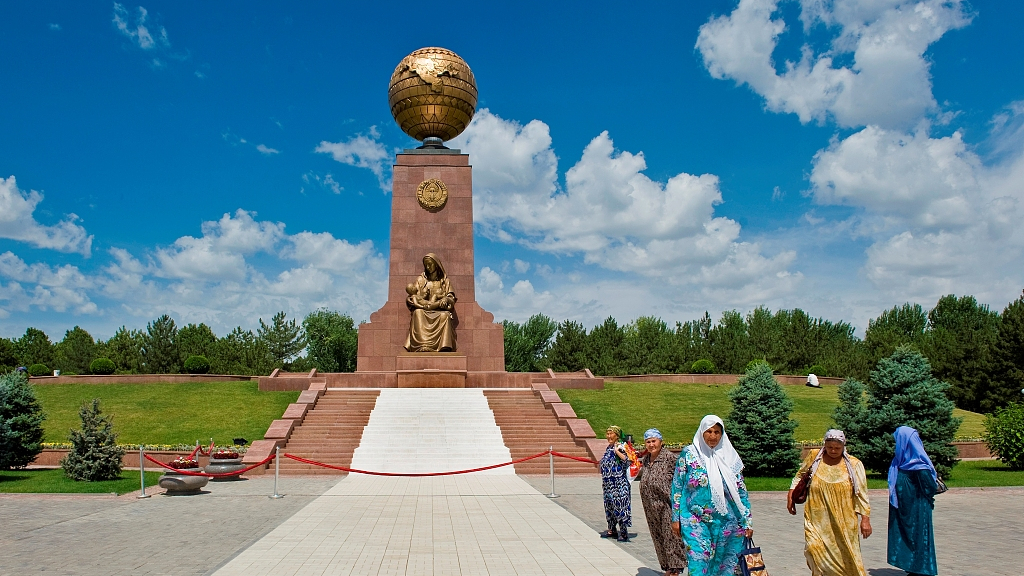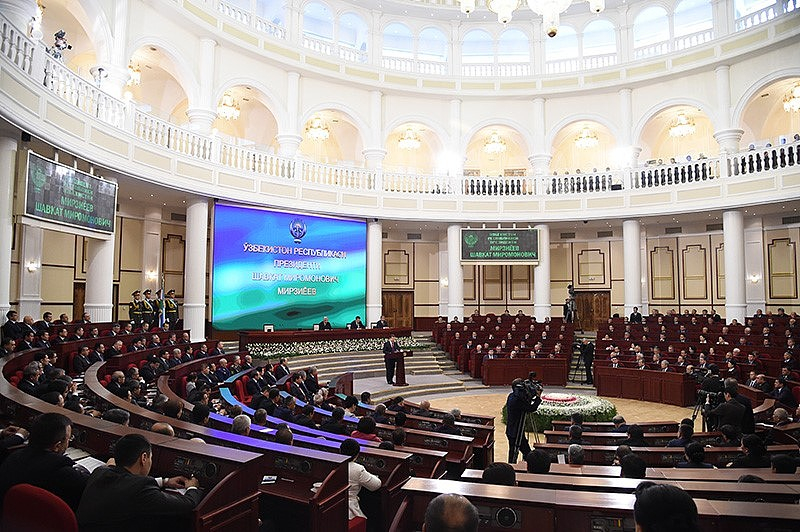
Editor's note: Zhao Huirong is a senior research fellow at the Institute of Russian, Eastern European and Central Asian Studies, Chinese Academy of Social Sciences. The article reflects the author's views and not necessarily those of CGTN.
From November 1 to 2, Chinese Premier Li Keqiang is paying an official visit to Uzbekistan and attend the 18th Meeting of the Shanghai Cooperation Organization Council of Heads of Government (Prime Ministers) in Tashkent.
The visit is expected to add momentum to better and broader cooperation between China and Uzbekistan, and bring benefits to the entire Eurasia.
Situated in the hinterland of Central Asia, Uzbekistan has a long history and rich culture, with a population of more than 30 million.
Although its economy and international influence are overshadowed by Kazakhstan, Uzbekistan, has always been a key player in Central Asian politics. In his famous work "The Grand Chessboard," Zbigniew Brzezinski called Uzbekistan a geopolitical axis and the soul for diverse national awakenings in Central Asia.
From 2009 to 2011, the China-Central Asia gas pipeline, which passes through Turkmenistan, Uzbekistan, Kazakhstan and ends in China, was built to transport natural gas from these countries to China, elevating the overall status of the five Central Asian countries in China's foreign policy.
In 2012, Uzbekistan became the second strategic partner of China in Central Asia after Kazakhstan.
In the following year, Chinese President Xi Jinping proposed the Belt and Road Initiative (BRI) in Kazakhstan. As the first stop of President Xi's state visit and hub of Central Asia, its importance in China's foreign policy agenda has once again been strengthened.
Uzbekistan is one of the only two doubly landlocked countries in the world and is keen on engaging in cooperation in areas such as transportation by joining the BRI.
In 2016, Sino-Uzbek relations were upgraded to a comprehensive strategic partnership. When Mirziyoyev was elected president in December of the same year. he presided over the ambitious reform and opening up program in the country. Uzbekistan's business environment and relations with neighboring countries have since improved significantly.
President Mirziyoyev threw his full weight behind the BRI. He said at the Second Belt and Road Forum for International Cooperation that the BRI will benefit Uzbekistan in building connections with other countries in transportation, economy, tourism and culture.

Uzbek President-elect Shavkat Mirziyoyev takes oath during his inauguration ceremony at the parliament in Tashkent, Uzbekistan, December 14, 2016. /VCG Photo
Uzbek President-elect Shavkat Mirziyoyev takes oath during his inauguration ceremony at the parliament in Tashkent, Uzbekistan, December 14, 2016. /VCG Photo
These links are beneficial to the development of Uzbekistan and the region. According to statistics from Uzbekistan, the trade volume between China and Uzbekistan in 2018 was about 6.428 billion U.S. dollars, a year-on-year increase of 35.2 percent, accounting for 19 percent of Uzbekistan's total foreign trade and making China the largest trade partner for Uzbekistan several years in a row.
From January to September 2019, the trade volume between China and Uzbekistan reached 5.911 billion U.S. dollars, a year-on-year increase of 32.9 percent. China's cumulative investment in Uzbekistan exceeded 7.8 billion U.S. dollars, and the number of Chinese-funded enterprises in Uzbekistan soared to 1,527.
These Chinese companies are mainly engaged in oil and gas exploration and development, construction and operation of natural gas pipeline, coal mines, power stations, pump stations, railway, chemical plants, and telecommunications network transformation as well as soil remediation.
Among the projects involving Chinese companies, the Qamchiq Tunnel of Anglian-Pap Electrified Railway is the most prominent one. It promotes the modernization of Uzbekistan's transportation sector and brings huge benefits to the local people. Another demonstrative project is the Pengsheng Industrial Park which has been jointly built by China and Uzbekistan.
China and Uzbekistan have great potential for cooperation under the framework of the BRI. Policy documents such as "Strategy of Actions in Five Priority Areas for the Development of Uzbekistan for 2017-2021" and "Concept of Integrated Socio-economic Development of the Republic of Uzbekistan until 2030" propose to build more robust national transport infrastructures, develop free economic zones, bolster green economy, shore up tourism, and address environmental problems and other pressing issues.
Under the framework of the Shanghai Cooperation Organization (SCO), Uzbekistan has played an active and constructive role in the areas of counter-terrorism, Afghan issue, security assurance of major events, cybersecurity, investment promotion, economic and trade cooperation, and citizen diplomacy.
The upcoming meeting of the Council of Heads of Government on November 2 will review and approve the "Outline of Multilateral Economic and Trade Cooperation of the Member States of the Shanghai Cooperation Organization for 2020-2035," the "Concept on Interaction between SCO Railway Administrations," the "Concept of SCO Cooperation in the Development of Remote and Rural Regions in the Digital Age," and the "Charter of SCO Economic Think Tank Alliance" and other documents, to promote the cooperation among the SCO member states in the fields of investment, economy, trade, digital economy, transportation, energy, industry, agriculture, customs, telecommunications, local governance, humanities, etc. and to promote security, stability and sustainable development in Eurasia.
(If you want to contribute and have specific expertise, please contact us at opinions@cgtn.com.)